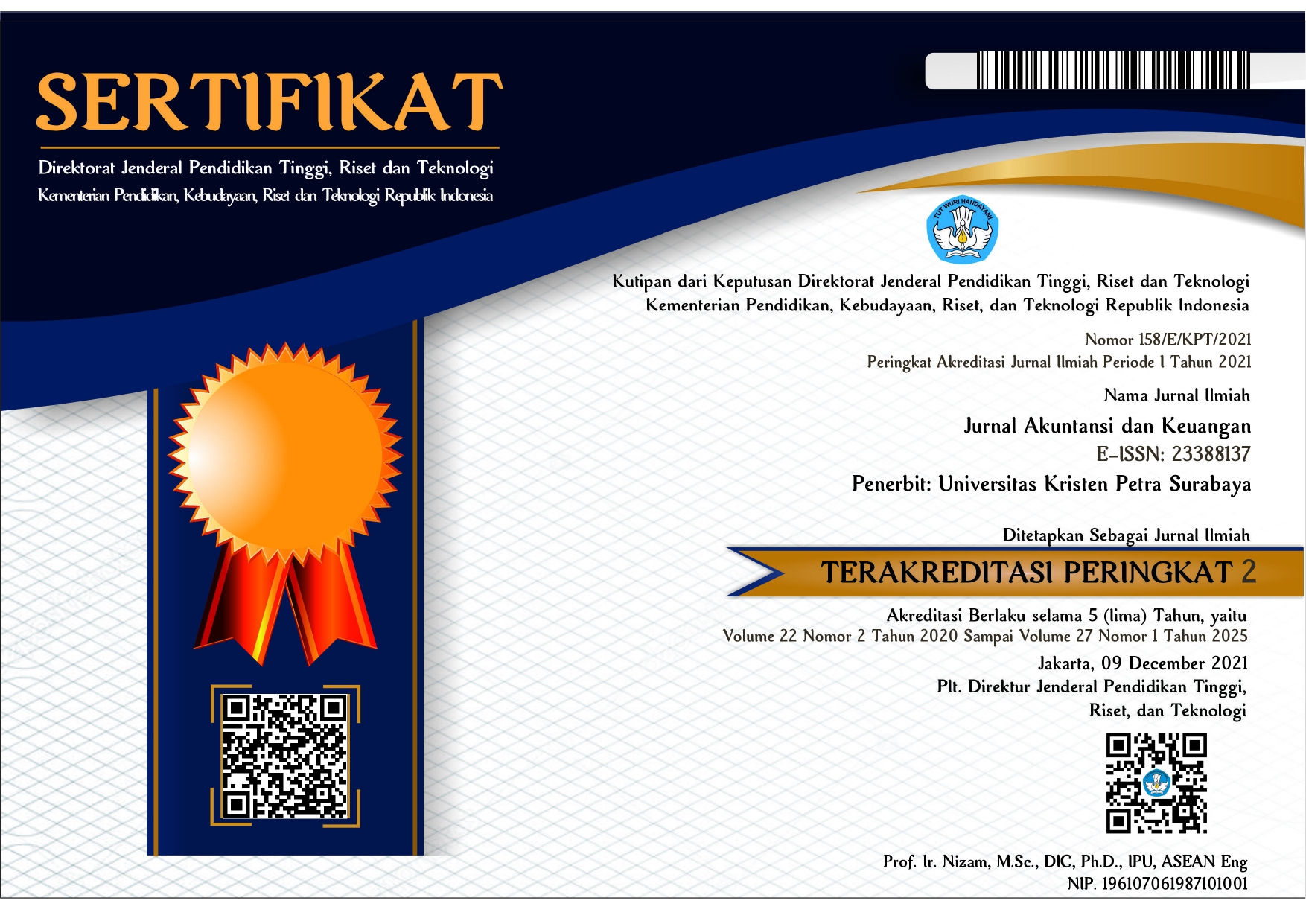Influence of Information Asymmetry and Self-Efficacy on Budgetary Slack: An Experimental Study
DOI:
https://doi.org/10.9744/jak.20.2.62-72Keywords:
Information asymmetry, budgetary slack, self-efficacy, budget participation.Abstract
Participation in the budgetary process does not only comes with a positive effect(s) but could also lead to negative behavior(s) of employees, one of which is the creation of budgetary slack. Previous studies said that information asymmetry is rated as one of the causes of the creation of budgetary slack. The purposes of this 3x2 factorial experimental study and between subject designs are to see the effect of information asymmetry on the budgetary slack and see whether information asymmetry and self-efficacy leads to the creation of budgetary slack. This study involved 65 undergraduate and postgraduate students from the accounting department of Economics and Business Faculty in Universitas Airlangga Surabaya as participants. One way ANOVA and two- way ANOVA is used to test and analyze the proposed hypothesis. Results show that information asymmetry influences the creation of budgetary slack. However, production managers with high or low self-efficacy are still taking advantage of asymmetric information that happened to do budgetary slack.
References
Anshori, M. & S. Iswati, 2009. Metodologi Pene-litian Kuantitatif Bahan Ajar. Surabaya: Fakul¬tas Ekonomi Universitas Airlangga.
Anthony, R.N., & V. Govindarajan. 2005. Mana-gement Control System. USA: McGraw-Hill.
Arthaswadaya, A. 2015. Pengaruh Asimetri Informasi Terhadap Budgetary Slack Dengan Self Esteem Sebagai Variabel Pemoderasi: Studi Eksperimen Dalam Konteks Pengang¬garan Partisipatif. Skripsi. Universitas Negeri Yogyakarta.
Baiman, S. 1982. Agency Research in Mana¬ge¬rial Accounting: A Survey. Journal of Account-ing Literature
Baiman, S., & J. H. Evans. 1983. Pre-decision information and participative manage-ment control systems. Journal of Accounting Research, 21
Bandura, A. 1994. Self-Efficacy. Encyclopedia of Human Behavior. Vol. 4: 71-81.
Born, A., R. Schwarzer & M. Jerusalem. 1995. “Indonesian Adaptation of the General Self-Efficacy Scale”. Downloaded from http://user-page.fu-berlin.de/~health/selfscal.htm, 28 De-cember 2015.
Carl S.W., J.M. Reeve & P.E. Fess. 2005. Finan-cial & Managerial Accounting 8th Edition. USA: Thomson South-Western.
De Faria, D.S. 2013. The Effect of Information Asymmetry on Budget Slack: An Experimen¬tal Research. African Journal of Business Management. Vol. 7(13): 1086-1099.
Dewi, R. P. 2008. Pengaruh Budgetary Goal Characterictic Terhadap Kesenjangan Ang¬gar¬an: Instansi Pemerintah Daerah Kota Padang. Skripsi. Universitas Negeri Padang.
Douglas, P. C., and B. Wier. 2000. Integrating Ethical Dimensions Into a Model of Budge¬tary Slack. Journal of Business Ethics. Vol. 28 (3): 267-277.
Dunk, Alan S. 1993. The Effect of Budget Emphasis and Information Asymmetry on The Relation Between Budgetary Slack Participation and Slack. The Accounting Review. Vol. 68(2): 400-410.
Dunk, Alan S. & Hossein Nouri. 1998. Ante-cedents of Budgetary Slack: A Literature Review and Synthesis. Journal of Accounting Literature. Vol. 17: 72-96.
Falikhatun. 2007. Interaksi Informasi Asime¬tri, Budaya Organisasi, dan Group Cohesive¬ness dalam Hubungan Antara Partisipasi Penganggaran dan Budgetary Slack (Studi Kasus pada Rumah Sakit Umum Daerah se-Jawa Tengah). Simposium Nasional Akun¬tansi (SNA) X. Makasar (26-27 Juli 2007).
Ghozali, I. 2011. Analisis Multivariate dengan Program SPSS. Edisi ke-5. Semarang: Badan Penerbitan Universitas Diponegoro.
Hermastho, B. 2001. Analisis Pengaruh Vari¬a¬bel Struktur Organisasi, Kultur Organisasi, Locus of Control, Self-Efficacy, dan Job-Relevant Information Terhadap Efektivitas Anggaran Partisipasi; Studi Konfirmasi Kiner¬ja Manajerial pada Industri Jasa Oerbankan di Jawa Tengah. Tesis. Magister Manajemen Program Pascasarjana Universi¬tas Diponegoro Semarang.
Lukka, K. 1988. Budgetary Biasing in Organi-zations: Theoretical Framework and Empiri¬cal Evidence. The Accounting Review. Vol 13: 281-302.
Luthan, F. 1995, “Organizational Behavior”, McGraw-Hill, Inc.
Mahanani, T. 2009. Pengaruh Partisipasi Anggaran Terhadap Kinerja Manajerial dengan Self Efficacy, Social Desirability, dan Organizational Commitment sebagai Variabel Intervening. Skripsi. Universitas Sebelas Maret Surakarta
Merchant. K.A. 1985. Budgeting and The Propensity to Create Budgetary Slack. Accounting, Organization, and Society. Vol. 10(2): 201-210.
Nugrahani, T. & S. Sugiri, S. 2004. Pengaruh Reputasi, Etika, dan Self Esteem Suboridinat di Bawah Asimetri Informasi. Journal of Indonesian Economy & Business. Vol. 19(4): 375-388.
Nugrahani, T.S. 2006. Pengaruh Kompensasi dan Asimetri Informasi Pada Kesenjangan Anggaran. Diunduh dari http://trisiwinugra-hani.blogspot.co.id tanggal 28 Desember 2015.
Pello, E.V. 2014. Pengaruh Asimetri Infor¬masi dan Locus of Control pada Hubungan Antara Penganggaran Partisipatif dengan Senjangan Anggaran. E-Jurnal Akuntansi Universitas Udayana. Vol. 6(2): 287-305.
Pope, P. F. 1984. Information Asymmetries in Participative Budgeting: A Bargaining Appro¬ach. Journal of Business Finance & Account¬ing. Vol 11 (Spring): 41-59.
Saks, A. M. 1994. Moderating Effects of Self-Efficacy for Relationship Between Training Method and Anxiety and Stress Reactions of Newcomers. Journal of Organization Beha¬vior. Vol 15: 639-654.
Siegel, G., & H.R. Marconi. 1989. Behavioral Accounting. USA: South-Western Publishing Co.
Stevens, D.E. 2002. The Effects of Reputation and Ethics on Budgetary Slack. Journal of Management Accounting Research. Vol. 14, 153-171.
Stumpf A., & A.P. Brief. 1987. Self-efficacy Expectations and Coping With Career-Related Events. Journal of Vocational Beha¬vior. Vol. 31(1): 91-108.
Downloads
Published
How to Cite
Issue
Section
License
Authors who publish with this journal agree to the following terms:
- Authors retain the copyright and publishing right, and grant the journal right of first publication with the work simultaneously licensed under a Creative Commons Attribution License that allows others to share the work with an acknowledgement of the work's authorship and initial publication in this journal.
- Authors are able to enter into separate, additional contractual arrangements for the non-exclusive distribution of the journal's published version of the work (e.g., post it to an institutional repository or publish it in a book), with an acknowledgement of its initial publication in this journal.
- Authors are permitted and encouraged to post their work online (e.g., in institutional repositories or on their website) followingthe publication of the article, as it can lead to productive exchanges, as well as earlier and greater citation of published work (See The Effect of Open Access).<a href="http://creativecommons.org/lice














